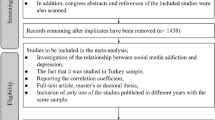Abstract
The literature has seen a surge in research on the mental health impacts of technologies such as Facebook, Twitter and other social media, but little is known regarding how mental health workers perceive patients and clients who report use of such technologies. The present study examines how psychiatrists perceive social media and whether they make use of it. Psychiatrists (N = 48) at a tertiary care centre in Canada completed a questionnaire assessing history of using social networking sites (SNSs) such as Facebook and Google Plus and status update sites (SUSs) such as Twitter and Livejournal and whether they associate them with psychopathology. 38.5 % have used SNSs and 9.8 % have used SUSs. Only 37 % believed there was an association between psychopathology and SNSs while 33 % believed there was an association between psychopathology and SUSs. Implications for clinical practice and future research are discussed.
Similar content being viewed by others
References
Hether HJ, Murphy ST, Valente TW. It’s better to give than to receive: The role of social support, trust, and participation on health-related social networking sites. Journal of Health Communication 19:1424–39, 2014.
Oh HJ, Lauckner C, Boehmer J, Fewins-Bliss R, Li K. Facebooking for health: An examination into the solicitation and effects of health-related social support on social networking sites. Computers in Human Behavior 29:2072–80, 2013.
Vance K, Howe W, Dellavalle RP. Social internet sites as a source of public health information. Dermatologic Clinics 27:133–6, 2009.
Cain J, Scott DR, Akers P. Pharmacy students’ Facebook activity and opinions regarding accountability and e-professionalism. American Journal of Pharmaceutical Education 73:104, 2009.
DeJong SM. Professionalism and adolescent psychiatry in the digital age. Adolescent Psychiatry 4:64–72, 2014.
Frankish K, Ryan C, Harris A. Psychiatry and online social media: Potential, pitfalls and ethical guidelines for psychiatrists and trainees. Australasian Psychiatry 20:181–7, 2012.
Moubarak G, Guiot A, Benhamou Y, Benhamou A, Hariri S. Facebook activity of residents and fellows and its impact on the doctor-patient relationship. Journal of Medical Ethics 37:101–4, 2011.
Jelenchick LA, Eickhoff JC, Moreno MA. “Facebook depression?” social networking site use and depression in older adolescents. Journal of Adolescent Health 52:128–30, 2013.
Moreno MA, Jelenchick LA, Egan KG, Cox E, Young H, Gannon KE, Becker T. Feeling bad on Facebook: Depression disclosures by college students on a social networking site. Depression and Anxiety 28:447–55, 2011.
Pantic I. Social networking and depression: An emerging issue in behavioral physiology and psychiatric research. Journal of Adolescent Health 54:745–6, 2014.
Johnson B, Knobloch-Westerwick S. Glancing up or down: Mood management and selective social comparisons on social networking sites. Computers in Human Behavior 41:33–9, 2014.
Neiger BL, Thackeray R, Burton SH, Thackeray CR, Reese JH. Use of twitter among local health departments: An analysis of information sharing, engagement, and action. Journal of Medical Internet Research 15:e177, 2013.
Reips UD, Garaizar P. Mining twitter: A source for psychological wisdom of the crowds. Behavior Research Methods 43:635–42, 2011.
Repique RJ. Using tweets to facilitate the conversation about evidence-based psychiatric and mental health care. Journal of the American Psychiatric Nurses Association 20(3):205–206, 2014.
Deen SR, Withers A, Hellerstein DJ. Mental health practitioners’ use and attitudes regarding the Internet and social media. Journal of Psychiatric Practice 19:454–63, 2013.
Koh S, Cattell GM, Cochran DM, Krasner A, Langheim FJ, Sasso DA. Psychiatrists’ use of electronic communication and social media and a proposed framework for future guidelines. Journal of Psychiatric Practice 19:254–63, 2013.
Lis E, Chiniara C, Biskin R, Montoro R. Psychiatrists’ perceptions of role-playing games. Psychiatric Quarterly 2015, 10.1007/s11126-015-9339-5.
Asch DA, Jedrziewski MK, Christakis NA. Response rates to mail surveys published in medical journals. Journal of Clinical Epidemiology 50:1129–36, 1997.
Maheux B, Legault C, Lambert J. Increasing response rates in physicians’ mail surveys: An experimental study. American Journal of Public Health 79:638–9, 1989.
VanGeest JB, Johnson TP, Welch VL. Methodologies for improving response rates in surveys of physicians: A systematic review. Evaluation and the Health Professions 30:303–21, 2007.
Custers K. The urgent matter of online pro-eating disorder content and children: Clinical practice. European Journal of Pediatrics 2015, 10.1007/s00431-015-2487-7.
Conflict of interest
All authors declare that they have no conflict of interest.
Informed Consent Statement
All procedures followed were in accordance with the ethical standards of the responsible committee on human experimentation (institutional and national) and with the Helsinki Declaration of 1975, as revised in 2000 (5). Informed consent was obtained from all patients for being included in the study.
Author information
Authors and Affiliations
Corresponding author
Rights and permissions
About this article
Cite this article
Lis, E., Wood, M.A., Chiniara, C. et al. Psychiatrists’ Perceptions of Facebook and Other Social Media. Psychiatr Q 86, 597–602 (2015). https://doi.org/10.1007/s11126-015-9358-2
Published:
Issue Date:
DOI: https://doi.org/10.1007/s11126-015-9358-2




